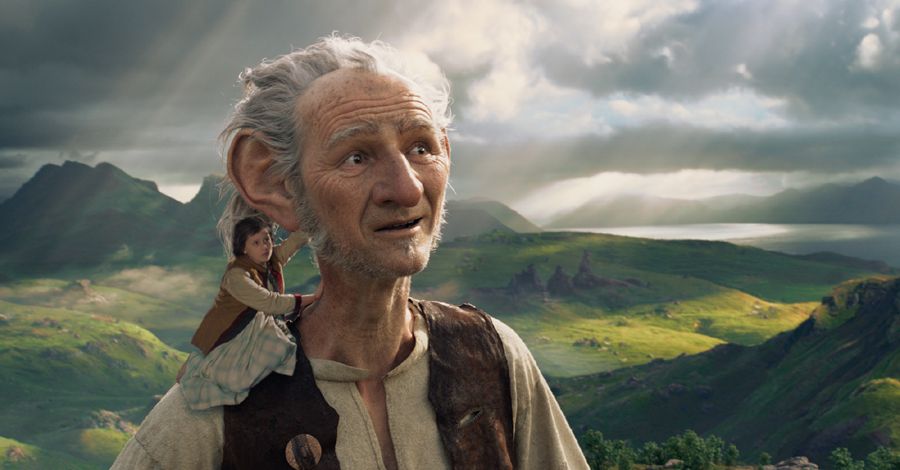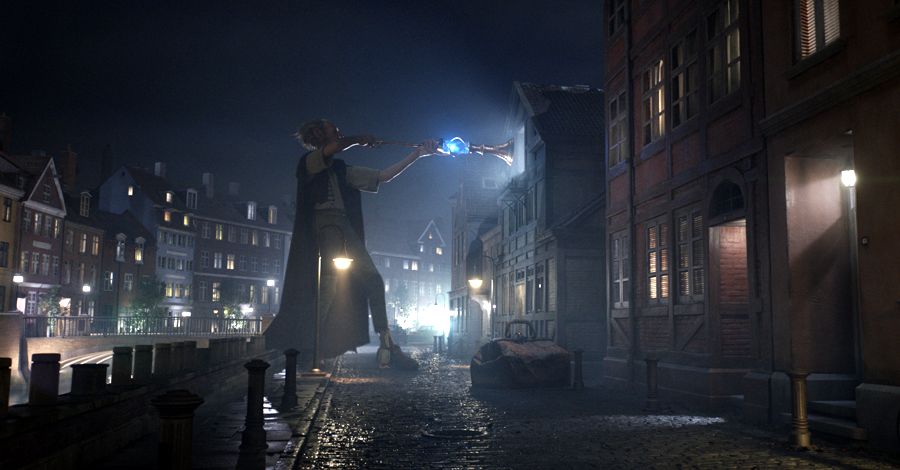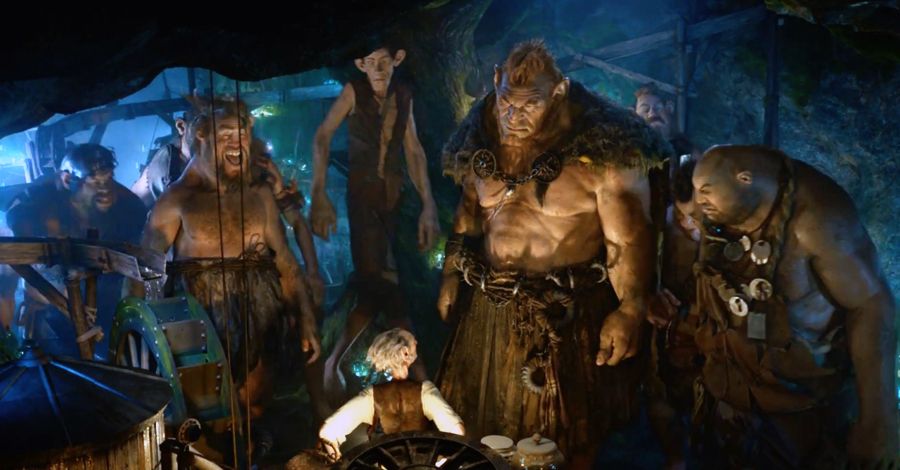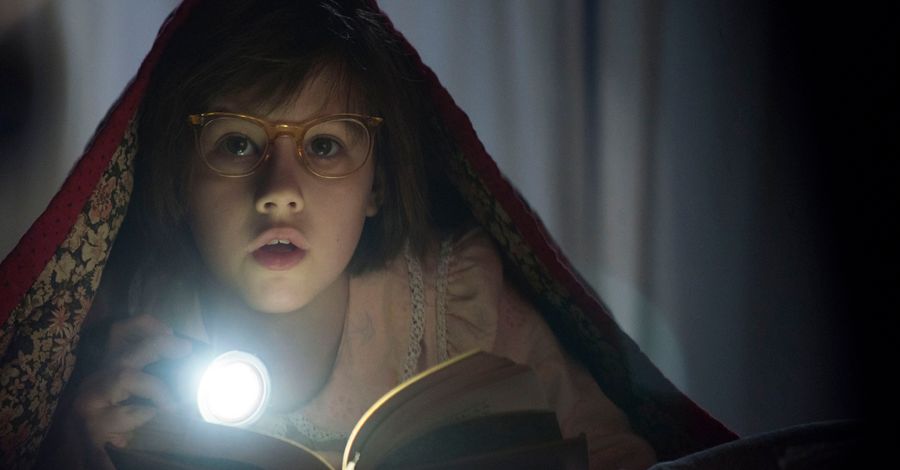How do you make a kids' movie about cannibalism? That was the odd quandary faced by Disney as it adapted Roald Dahl's children's book "The BFG." While the eponymous "Big Friendly Giant" is a dedicated vegetarian, his bigger, nastier brethren are literal man-eaters who happily gobble children whole. It's something that's scary in a book, but potentially traumatizing on a theater's massive screen, made all the more enveloping with 3D.
However, when Steven Spielberg is on board to direct, you charge ahead, cannibalism concerns or no! And so, we get the teetering summer tent pole "The BFG," a horror movie for kids that's afraid to be scary, and so instead opts for meandering and mean.
"The BFG" centers on a little insomniac named Sophie (Ruby Barnhill), who spends the wee hours wandering around a cavernous orphanage, reading, and hollering at the drunks capering in the London street below. That night-owl routine throws her in the path of a titular titan, who scoops Sophie right out of bed and whisks her off to the Land of the Giants. After a rocky start, the pair bonds over books, dream catching (with a big butterfly net!) and a shared sense of isolation. But the BFG's nasty neighbors spoil this bliss with human "beans" hunts that culminate in the kidnapping (and presumable consumption) of scads of boarding school students. From there, it's up to this plucky orphan, her brave giant and Queen Elizabeth II to end the mighty threat!
Make no mistake: that threat is cannibalism, and it's just about the only stakes the movie offers. With no family, established friends or love for the orphanage, there's no dramatic weight to Sophie's abduction. And while BFG is pushed around by the other giants, it's been that way for untold centuries. It's purely the threat of English moppets being gulped down alive that gives the adventure any drama. Yet "The BFG" won't even say the word "cannibalism." Instead it settles on BFG's befuddled "Wigglish," which adds extra-silly syllables to make this grisly act seem distant and fantastical (like "rumple bumpuss," "telly telly bunkybus" "jiggyraffes"). Even the missing school children -- introduced in a cryptic newspaper headline -- are never seen or mentioned again, perhaps in hopes that the little ones in the audience won't do the dismal math?
Wobbling about the story's inherent horror makes for a muddled tale that blunders from one inexplicable set piece to the next. Yet, Spielberg is sure to add some whimsy, wonder and fun. One standout sequence has the BFG scampering through the moonlit streets of London, hiding himself from passersby using clever and comical camouflage techniques, like posing flamingo-style to resemble a tree in silhouette. The voice casting of Mark Rylance, who recently won an Oscar for Spielberg' "Bridge of Spies," is inspired. The character actor wraps his warm tones around the BFG's weird words to bring to life a bewildered but lovable hero. And the animation, which makes the character look like a 100-year-old Liam Neeson with overgrown ears, has a quirky charm.
Jemaine Clement ("The Flight of the Conchords") brings a snarling menace as the bullying giant Fleshlumpeater, while character actors Rafe Spall, Penelope Wilton and Adam Godley contribute an element of farcical fun to the Great Britain bits, playing a posh attendant, the curious Queen and a gallivanting drunkard, respectively.
But the film feels tortuously long, digging dogmatically into clunky dialogue and leaning hard into an extended breakfast sequence. Here, the plot comes to a complete stop so the audience can observe the extraordinary and inventive lengths that Buckingham Palace's waitstaff will go through to properly fete a giant. If grandfather clocks as table legs and ceremonial swords as butter knives strike you as hilarious, you'll be overwhelmed with riches. Otherwise, you'll be bored as the scene cuts from one silly size gag to another, and then back to the its bemused child hero, who may be this giant tale's biggest problem.
Sophie is matter-of-factly introduced as an orphan, bookworm and insomniac. She interacts with no one before BFG, so the film doesn't bother to establish her personality before pitching us into the plot. In a curious move, we get to know her as BFG does. But while he is charmed by Sophie's assertiveness and bullying, I found her increasingly obnoxious. The script has her repeatedly berating and belittling BFG, pointedly correcting his "squiggly" diction ("beings not beans!") and rolling her eyes when he fumbles in human etiquette. She barks orders at him tirelessly, and pitches a near-suicidal fit when he refuses to answer her call. Ultimately, Sophie is a tyrannical little brat that the film and the giant holds up as a great hero, despite her having no clear motivation, consideration or talents for much of the run time.
Watching "The BFG," I was struck by how much it has in common with another recent Disney offering, "The Jungle Book." Both are based on literature that center on a child hero who makes fantastical friends, be they an amicable giant or wild animals who can talk and sing. Both are big-budget productions that ask a child actor to shoulder the responsibility of being the primary live-action component in worlds of CG-generated sets and creatures. But where "The Jungle Book" went so right, "The BFG" went wrong.
Jon Favreau's direction prompted a performance out of his child star, Neel Sethi, that was often cutesy yet authentic, and overall exuberant. However, from Barnhill, Spielberg elicits mostly sulking, staring and scowling. The CG of "Jungle Book" was so strikingly photo-realistic that I struggled to accept there weren't actual wild animals in the mix, but "The BFG's" animation doesn't meet that standard. Lacking the texture and weight of photo-realism, its eccentric animation leaves Sophie frequently stranded in a clearly cartoon world. She only fits in during action scenes where her live-action body is swapped for a rubbery computer-animated one. (Think "Harry Potter and the Sorcerer's Stone"s wonky troll scene.)
The most galling difference is in the character of its child heroes. Both are stubborn: Mowgli resolutely doesn't want to leave the jungle, despite the threat of Shere Khan, and Sophie doesn't want to leave BFG's delightful bungalow (complete with indoor waterfall, pirate ship bed and glittering dream library), despite the threat of cannibalistic giants. Yet Mowgli is introduced with moxie, racing through the jungle, and he's shown to be talented through the ingenuity of his man-made inventions. We like him, and crave to see his story and his victory. Alternately, Sophie is introduced staring, sneaking and hollering. Her only established talent seems to be badgering poor BFG. As that makes up much of her screen time, she becomes more of a pest than a pleasing protagonist. Without an engaging hero, the film's emotional beats feel painfully forced.
When I heard the film's bad buzz out of Cannes, I assumed it was overblown. After all, one of the most prestigious (and arguably pretentious) film festivals in the world doesn't seem the ideal introduction for a Spielberg crowd-pleaser. But this isn't that. "The BFG" drains a dark fantastical tale of its horror, leaving a husk of silly words and shallow sincerity. But for all its faults, "The BFG" does give us the unusual and amusing image of the Queen's pet corgis rocketing around royal halls powered by green, billowing fart clouds. So that's something.
"The BFG" opens July 1.




